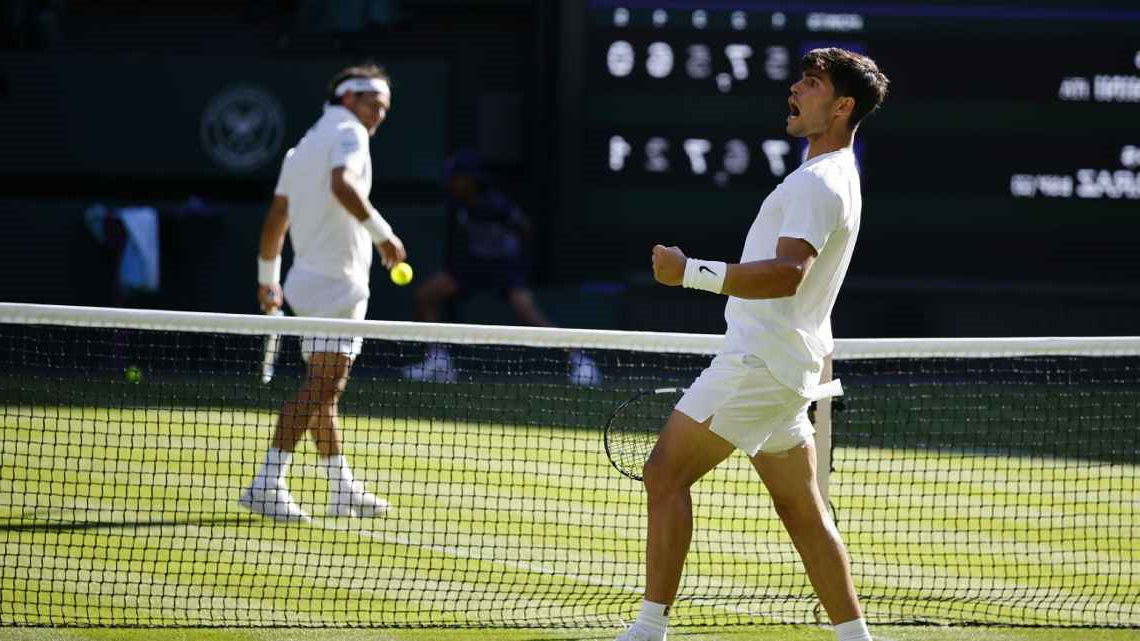Carlos Alcaraz, the reigning two-time champion at the prestigious All England Club, faced an unexpectedly grueling test in his opening match at Wimbledon on Monday.
Locked in a tense, five-set struggle on the hallowed grounds of Centre Court, the young Spaniard found himself pushed to his limits by an opponent many had underestimated. His opponent was none other than Fabio Fognini, an Italian veteran of 38 years, who had announced his retirement after the current season and entered the tournament winless in 2025. Despite these statistics, Fognini displayed a level of play that defied his age and recent record.
During a particularly arduous moment in the match, Alcaraz reportedly looked toward his coach and shouted something about Fognini, remarking on how the older player “looked as if he could keep playing until he’s 50.” This sentiment was echoed by Alcaraz himself in his post-match interview, where he admitted, “I don’t know why it’s his last Wimbledon, because the level he has shown, he can still play three or four more years.
Unbelievable.” The match ultimately stretched to more than 4 1/2 hours of intense back-and-forth shifts, culminating in Alcaraz emerging with a hard-fought 7-5, 6-7 (5), 7-5, 2-6, 6-1 victory in the first round. This was a far tougher start than anticipated for a player of Alcaraz’s caliber, setting an immediate tone of unexpected challenges at this year’s Wimbledon.
The Mismatched Expectation: Alcaraz vs. Fognini
On paper, the first-round encounter between Carlos Alcaraz and Fabio Fognini appeared to be a straightforward affair, with all signs pointing to a comfortable victory for the younger champion. However, the reality on Centre Court was vastly different.
A Tale of Two Careers
The statistical contrast between Carlos Alcaraz and Fabio Fognini entering their Wimbledon first-round clash was stark, making the match’s grueling nature all the more surprising. On one side stood the formidable Alcaraz. At just 22 years old, he is already a tennis sensation, boasting an impressive collection of five Grand Slam titles. This includes his most recent triumph, secured just three weeks prior at the French Open, where he displayed incredible resilience. Furthermore, Alcaraz arrived at Wimbledon on a career-best 19-match winning streak, a testament to his current dominance and consistent form across various surfaces. His seeding at No. 2 underscored his elite status in men’s tennis.
Conversely, Fabio Fognini presented a far less intimidating profile. The 38-year-old Italian veteran, playing in what he has declared to be his final season on tour, has never found significant success on the grass courts of the All England Club. In his 15 previous appearances at Wimbledon, Fognini had never advanced beyond the third round. His best Grand Slam performance was a solitary quarterfinal appearance, which occurred way back at the 2011 French Open.
He entered Monday’s match ranked a lowly 138th in the world and, perhaps most tellingly, was winless in 2025 with an 0-6 record. These statistics painted a clear picture of a seasoned but struggling player facing a peak-form champion. Yet, Fognini’s performance on Monday defied all expectations, showcasing the unpredictable nature of Grand Slam tennis.
Alcaraz’s Uncharacteristic Struggles
Despite eventually securing the victory, there were numerous moments throughout the match where Carlos Alcaraz appeared to be operating at something “less than his best.” His performance was noticeably “far from the form he displayed during his epic five-set, 5 1/2-hour comeback victory over No. 1 Jannik Sinner for the championship at Roland-Garros” just weeks prior. This stark contrast in form raised questions about his readiness for the unique challenges of grass-court tennis and the pressures of defending a Grand Slam title.
Alcaraz’s stat sheet from the match revealed several uncharacteristic struggles. He recorded a concerning nine double-faults, indicating issues with his serve consistency. Furthermore, he faced a “hard-to-believe 21 break points” throughout the match, a testament to Fognini’s ability to pressure his serve and Alcaraz’s own vulnerabilities. In terms of shot-making, Alcaraz made significantly “more unforced errors, 62, than winners, 52,” suggesting a lack of precision and controlled aggression that is usually a hallmark of his game. He later attributed some of these struggles to nerves.
“Playing the first match at Centre Court, and the first match of every tournament, is never easy,” Alcaraz explained, despite having famously beaten Novak Djokovic in the 2023 and 2024 finals on that very same arena. He acknowledged the unique atmosphere of the tournament, stating, “I’ve been practicing pretty well. I’ve been playing on grass really well. But Wimbledon is special. It’s different.” This candid admission highlighted the psychological pressures even top champions face, especially when defending a prestigious title.
The Pressure of Being a Champion
Being a reigning champion at Wimbledon comes with a unique set of pressures, and history shows that even the greatest can falter in their opening defense.
Avoiding a Rare First-Round Exit
The history of Wimbledon is replete with stories of champions and challengers, but it also carries the rare distinction of reigning champions faltering early. The statistic highlighting this rarity underscores the pressure on Carlos Alcaraz during his first-round match. Historically, “only twice has the reigning men’s champion at Wimbledon been beaten in the first round the following year.” This exclusive and unwanted club includes Lleyton Hewitt in 2003 and Manuel Santana in 1967. Hewitt, after winning in 2002, famously lost to Ivo Karlovic in the first round the following year, marking one of the biggest upsets in Wimbledon history. Santana’s early exit in 1967 also sent shockwaves through the tennis world.
This historical precedent means that every defending champion stepping onto Centre Court for their opening match carries the weight of not just winning the match, but also avoiding an embarrassing and statistically rare defeat. Alcaraz, aware of these historical footnotes, was battling not just Fognini but also the immense pressure of maintaining his perfect record as a defending champion. His eventual five-set struggle, the first time a reigning male champion had been pushed to a fifth set in the first round since Roger Federer in 2010, emphasized how close he came to joining that exclusive, undesirable list. This adds another layer of significance to his hard-fought victory, showcasing his resilience under immense historical and personal pressure.
Preparing for the Next Challenge
Despite his hard-fought victory against Fabio Fognini, Carlos Alcaraz was quick to acknowledge that his performance wasn’t flawless and that improvements would be necessary for future rounds. His critical self-assessment is a hallmark of elite athletes who constantly strive for perfection. “I have to improve in the next round,” Alcaraz stated, recognizing the areas where he struggled, such as his serve consistency and unforced error count. This commitment to continuous improvement, even after a win, highlights his championship mentality.
Alcaraz’s next challenge will be a match on Wednesday against Oliver Tarvet. Tarvet is a 21-year-old British qualifier who brings a unique background to the professional tour, as he plays college tennis at the University of San Diego. His current ranking of 733rd in the world indicates a significant disparity in experience and achievements compared to the world No. 2. While on paper this appears to be a more straightforward match,
Alcaraz’s opening-round struggles serve as a valuable reminder that no opponent at Wimbledon, regardless of ranking, can be underestimated. The champion will likely focus intensely on refining his serve, reducing unforced errors, and regaining the sharp, aggressive form that propelled him to back-to-back titles, ensuring he is fully prepared for Tarvet and any subsequent challenges in his quest for a third consecutive Wimbledon crown.
Fognini’s Temperament and the Match’s Turning Point
Fabio Fognini’s career has been marked by both flamboyant talent and occasional controversial outbursts. His performance against Alcaraz, however, showcased a different side, ultimately leading to a captivating battle that went down to the wire.
A History of On-Court Flare-Ups
Fabio Fognini has long been known as one of tennis’s more mercurial personalities, a self-described “hot-head” whose career has been punctuated by moments of brilliance and flashes of temper. He is particularly “known for mid-match flareups,” which have, on occasion, landed him in hot water with tennis authorities. Wimbledon itself has been the scene of some of his notable controversies. In 2019, he was fined $3,000 for making a highly inappropriate comment during a match, saying he wished “a bomb would explode at the club.” Earlier, in 2014, he received a then-record $27,500 fine for a series of outbursts during a match.
His most severe disciplinary action came in 2017 when he was put on a two-year probation by the Grand Slam Board after insulting a female chair umpire at the US Open, leading to his removal from that tournament. These incidents underscore a history of passionate, sometimes uncontrolled, emotional expression on court. However, during his grueling match against Carlos Alcaraz on Monday, such volatile “behavior wasn’t displayed.” Fognini maintained a composed demeanor, focusing on his game.
When Alcaraz pushed a forehand long, ceding the fourth set to Fognini, the Italian calmly “nodded toward his guest box,” where a member of his entourage captured the moment with a cellphone photo. At that moment, things were indeed “picture-perfect for Fognini,” showcasing a more disciplined side of his personality, free from the controversial outbursts that have sometimes defined his career.
Alcaraz’s Fifth-Set Recalibration
Despite Fognini’s spirited performance and his uncharacteristic composure, the match ultimately turned in the fifth set, where Carlos Alcaraz demonstrated his championship pedigree and ability to recalibrate under pressure. The start of the fifth set marked a significant moment: it was “the first time the previous year’s male champ was pushed that far in the first round since Roger Federer in 2010,” adding historical weight to the intense battle. At this critical juncture, Alcaraz seemed to find another gear.
The decisive shift came early in the final set. When the Spaniard secured a crucial break to lead 2-0 with a brilliant backhand volley winner, his emotional response was immediate and powerful. He “pointed toward the stands, threw an uppercut and screamed, ‘Vamos!'” a clear indication of his renewed focus and determination. In the very next game, Alcaraz faced further pressure, needing to save a pair of break points to consolidate his lead, showcasing his clutch play.
The intensity of the match, compounded by the conditions, led to a brief but notable pause: the match was “paused for more than 10 minutes because a spectator felt ill amid record-breaking high temperatures for Day 1 of Wimbledon.” This unforeseen delay could have disrupted Alcaraz’s momentum, but upon resumption, he showed no signs of faltering. Instead, he “outplayed Fognini the rest of the way,” methodically closing out the set and the match. This fifth-set resurgence demonstrated Alcaraz’s mental fortitude and his capacity to elevate his game when it mattered most, solidifying his hard-fought victory.
Gritty Victory and Wimbledon’s Intensity
Carlos Alcaraz’s first-round victory at Wimbledon was far from the routine opening match typically expected of a two-time defending champion. His grueling five-set battle against the unheralded Fabio Fognini, a match lasting over 4 1/2 hours, underscored the unique pressures and unpredictable nature of Grand Slam tennis, especially on Centre Court. Despite being winless in 2025 and approaching retirement, Fognini defied expectations, pushing the young Spaniard to his absolute limits and showcasing a surprising level of composure.
Alcaraz himself admitted to nerves and uncharacteristic struggles, including numerous double faults and unforced errors, a stark contrast to his dominant form just weeks earlier at the French Open. However, the champion’s true mettle shone through in the decisive fifth set. He recalibrated his game, found crucial breaks, and displayed the mental fortitude required to overcome a resilient opponent and avoid joining the rare list of reigning champions losing in the first round.
While he acknowledges the need for improvement in subsequent matches, this gritty victory serves as a testament to Alcaraz’s resilience and competitive spirit. As he advances to face Oliver Tarvet, this challenging opening match serves as a potent reminder of Wimbledon’s inherent intensity and the high stakes involved in defending a major title.








